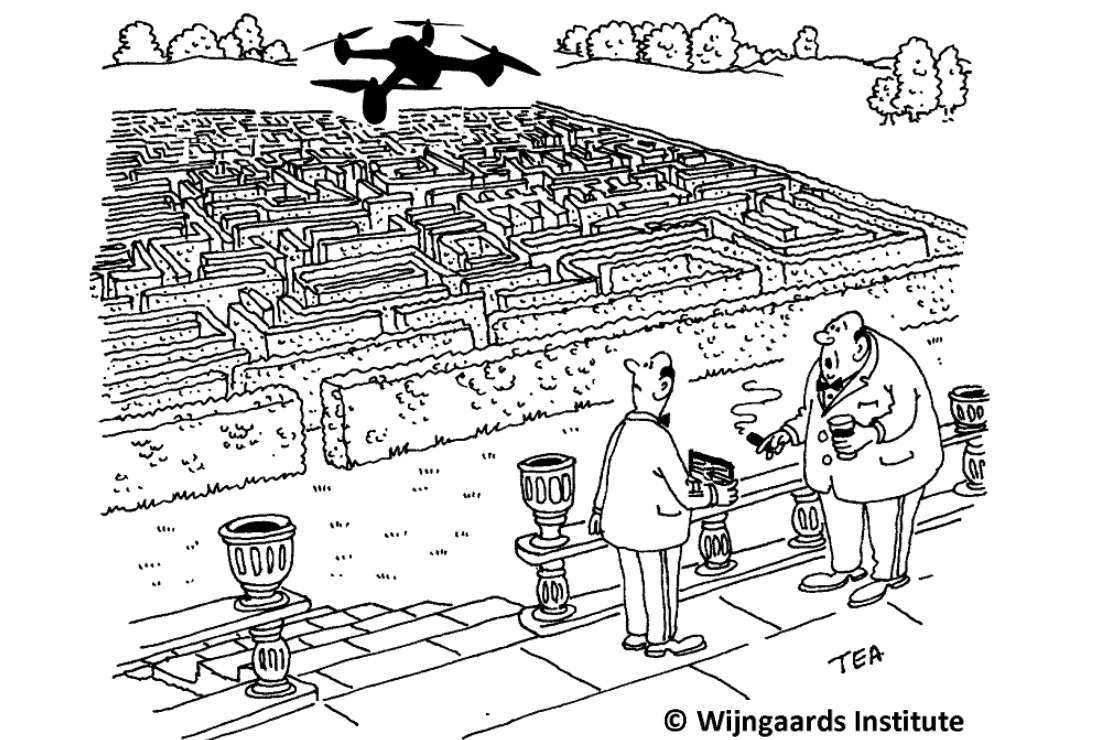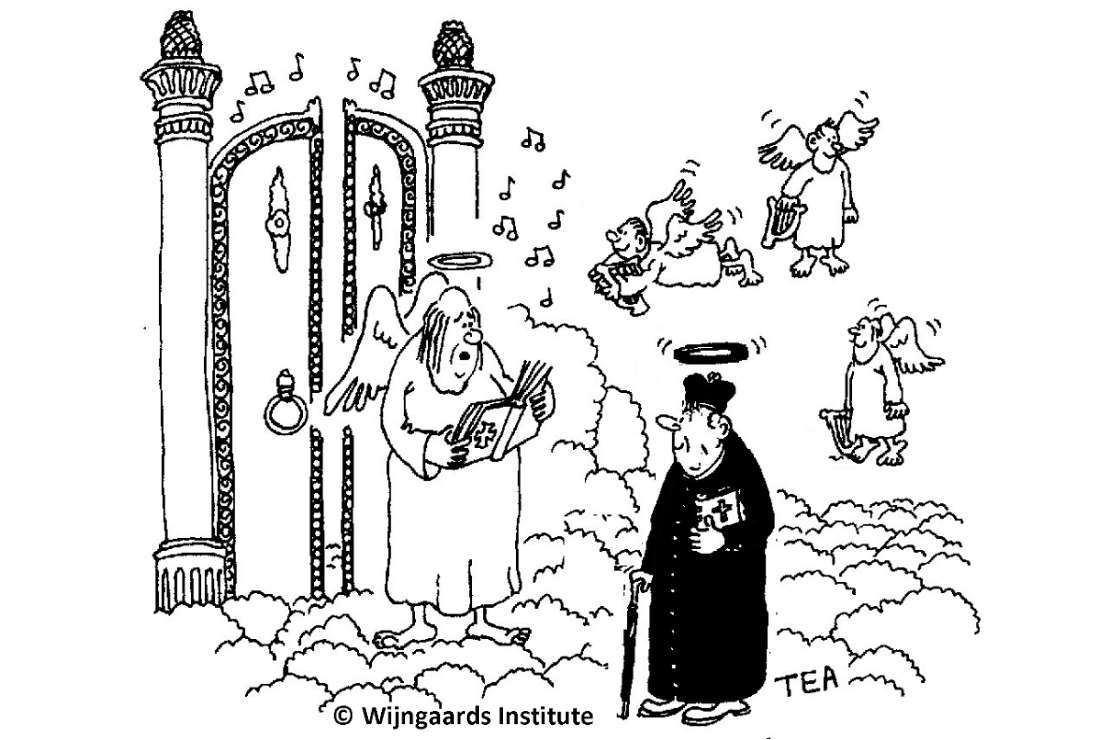Do Church leaders also listen to the Spirit speaking through experts — biologists, psychologists, sociologists?

"I must have dropped my wedding ring while walking through the maze. Can your drone retrieve it?" (Illustration: Tom Adcock)
“Jesus said: ‘Have you never read what David did when he and his companions were hungry and in need? During the high priesthood of Abiathar, he entered the house of God and ate the consecrated bread, which was lawful only for priests. And he gave some to his companions as well.” (Mark 2,25-26; see 1 Samuel 21,1-6; 22,20-23)
“I have much more to tell you, but now it is too hard for you to understand. But when the Spirit of truth comes, he will lead you into all the truth. He will not speak on his own, but he will tell you what he hears and will speak of things to come”. (John 16, 12-13)
Years ago, at a recollection day for youngsters, I was asked how many languages Jesus spoke. “Aramaic was his own language,” I said, “and he probably managed a smattering of Greek, as most Jews did in his time. But he would definitely not have understood English.”
Judy, a tall girl with long hair which framed her penetrating dark blue eyes, was visibly upset by this. “Jesus was God,” she protested. “He was omniscient. He knew everything. He must have known English. In fact, it would probably have taken him no more than five minutes to fill in The Times crossword puzzle. It was all there in his mind!”
“Hold on”, I said. “Yes, Jesus’ humanity conveyed/carried/communicated divinity. But that did not affect his being 100% human. Did Jesus not need to use his feet to walk from one place to the next? Wasn’t he tired and hungry at the end of a day, like anyone else? Did he not need a rest from time to time?”
“Yes”, she admitted reluctantly. “But that’s different, just physical. Omniscience resides in the mind!”
“I’m afraid you are wrong”, I replied. “Human limitations affected Jesus’s mind. Like his contemporaries, Jesus could not imagine what an electric train was like, or a motor car, an aeroplane, a TV set, a computer. As a human being he was in all respects like everyone else — just as he wanted to be. He called himself the ‘Son of Man’, an Aramaic expression for ‘the ordinary person’. He even could make mistakes, like remembering things wrongly.”
“Make mistakes?!”, she exclaimed. “Surely not! Can you prove that?”
“Yes”, I said. “Jesus got it wrong when he said that Abiathar was high priest when David ate of the consecrated loaves. We read in the first Book of Samuel that the high priest at the time was Abimelech and that Abiathar became high priest afterwards. Since Jesus had no personal copy of the Bible to consult, he had to remember texts by heart — from what he had heard at Sabbath readings. Confusing the names of Abimelech and Abiathar is the kind of memory slip anyone of us could have made. And it did not invalidate the point that Jesus was making. It simply was a human thing to do.”
Amplifying Jesus’ teaching in times to come
John’s Gospel differs from those of Mark, Matthew and Luke in that it explicitates/unfolds Jesus’ intentions. It addresses especially Hellenistic [Greek speaking] audiences at the end of the first century. It translates Jesus’ original Aramaic sayings into the more sophisticated language and thinking of the Graeco-Roman world.
John’s account of the Last Supper is also unique. It offers a long speech by Jesus in which he prepares the disciples for the years to come. The gist of it is that he himself will no longer be among them in his physical appearance. But he will remain present in a spiritual way, through his Spirit. The Spirit will make clear how Jesus’ intentions should be interpreted in fresh unexpected challenges of future times to come. “I have much more to tell you, but now it is too hard for you to understand. But when the Spirit of truth comes, he will lead you into all the truth. He will not speak on his own, but he will tell you what he hears and will speak of things to come” (John 16, 12-13).
These are crucial words indeed. And how will the Spirit speak? Will the Spirit reveal Jesus’ mind only through ordained Church leaders, through priests, bishops, popes? The answer is: No! The Spirit will operate throughout the community.
“There are different kinds of gifts, but the same Spirit distributes them. There are different kinds of service, but the same Lord. There are different kinds of working, but in all of them and in everyone it is the same God at work. Now to each one the manifestation of the Spirit is given for the common good. To one there is given through the Spirit a message of wisdom, to another a message of knowledge by means of the same Spirit, to another faith by the same Spirit, to another gifts of healing by that one Spirit, to another miraculous powers, to another prophecy, to another distinguishing between spirits, to another speaking in different kinds of tongues, and to still another the interpretation of tongues. All these are the work of one and the same Spirit, and God distributes them to each one, just as he determines” (1 Corinthians 12,28).
Questions
Our science-driven technological world creates fresh possibilities which also pose new moral dilemmas. How should spiritual authority respond to such challenges of our modern age?
In this new climate, do Church leaders also listen to the Spirit speaking through experts — biologists, psychologists, sociologists you name it?
Published by arrangement with the Wijngaards Institute for Catholic Research
*The views expressed in this article are those of the author and do not necessarily reflect the official editorial position of UCA News.










